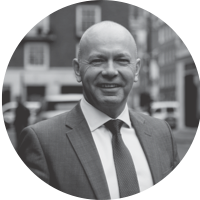The Guild of Property Professionals CEO, Iain McKenzie, caught up with property market analyst and CEO of Twindig, Anthony Codling, about his views on the latest announcements from both the Bank of England and the Chancellor of the Exchequer, Kwasi Kwarteng.
McKenzie notes that there seems to be a conflict at the moment between what the BoE is doing and what the government is doing. “It looks like they are not singing off the same song sheet. On the one hand the BoE is raising interest rates because they are trying to curb spending and keep a handle on inflation, however, on the other hand we have a mini-budget where the government is giving tax relief incentives to get the economy moving and people spending. So, who’s right and what is the thinking behind it?" asks McKenzie.
In response, Codling says that the BoE’s target is to keep inflation under 2%, which is where inflation was until late last year at which point it started to vastly increase and is now in double digit territory. “As consumers are aware, things are far more expensive now than they were a year ago. The bank’s main lever to tackle in inflation is interest rates, with the theory that if it is more expensive to borrow money people and businesses will borrow less and will spend less, and some of the heat will be taken out of the economy keeping inflation under control. The flip side, as mentioned, is we have a budget that is expansionary. So, to me, I agree, it does look like the BoE and the government are trying to do two different things at the moment and it will be interesting to see what impact that has as we move forward,” he says.
Codling notes that when the BoE was making their decision regarding the rate hike, it was a five/four decision, with five voting for a 50-basis point increase and four people voting against it. “The split was interesting in that three of the four people voted for 75-basis points and one for 25-basis points. My personal view was that they were in no-man’s land because they were flying blind against what the mini-budget was going to offer, which turned out to be the exact opposite,” he adds.
According to Codling the reason there is talk at the moment about a potential emergency MPC meeting to raise interest rates again, is we now have the lowest dollar/pound exchange rate since the mid-80s, which is an issue because so many things are priced in dollars, such as oil for example. “The exchange rate will make it more expensive for us to import things into the country, which again will make inflation go up, impacting the cost of living. On top of that the government is going to have to borrow a lot of money to pay for the tax cuts and the support on energy bills. The rate at which the government is borrowing money has increased, which is also having a knock-on effect on the exchange rate. Ironically, how you would resolve that is by increasing interest rates to attract foreign investment into the UK to strengthen the exchange rate and reduce import inflation,” he comments.
How will these aspects impact the property market, asks McKenzie.
Codling adds that if money is being put back into people’s pockets by tax relief and they are avoiding taking on debt because of interest rates, we could see more people saving. “You could argue it will be good for the property market as people will potentially have more money in savings for their next house, which is kind of what we saw during lockdown. People couldn’t spend their money, which was a sort of enforced savings. They wanted more space and now had savings in the bank to be able to move. This created massive demand in the market and house prices went up. Looking at the data, house prices went up 16 times more than the savings you had on stamp duty. Hence the 15.5% growth figure recently released,” he says.
According to Codling the dollar/pound exchange rate will have a positive impact on the London housing market as well as the high-end sector of the property market because overseas buyers can suddenly buy more property for their money.
The potential challenge to the property market is whether the interest rates could cancel out the effects of the stamp duty cut. “Broadly, for every one percent increase of the interest rate, it will cost £50 more a month per £100,000 on a mortgage. That could soon eat into a stamp duty cut,” says Codling.
McKenzie says that the feedback he is getting it that there is a race for a five-year fix on rates available in the market. “That is stimulating activity market and data shows that buyer registrations are 20% higher than pre-pandemic levels, so there is still the desire to purchase property within the despite the economic challenges,” he adds.
Codling agrees, saying: “There is definitely a desire for property. And, rather than a race to take advantage of the stamp duty cut before it ends as we would if it was a holiday, we are seeing a race for buyers to lock in their fixed rate at their current levels. The market suggests that the interest rates could peak at around 5% to 5.5% in 2023, which shows how quickly things can change from the initial 2% to 3% initially predicted.”
Looking at house prices, Codling says that he believes there will still be some stock shortages during the short-term as people adopt a wait-and-see approach over the next few months, which will result in prices continuing their upward trajectory if demand is sustained. “Demand is already greater than supply and now we have the stamp duty cut, many people who have had their wages increased and taxes cut. This will all have a positive impact on house prices, especially in the medium term,” he concludes.

